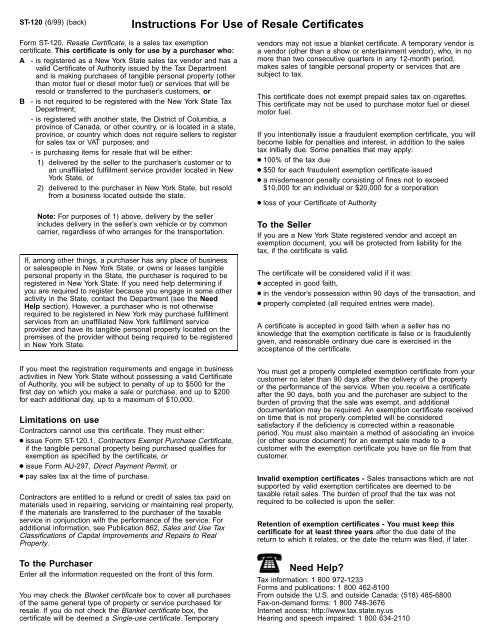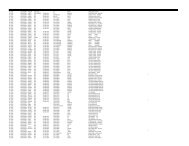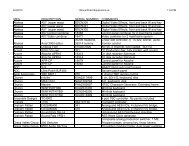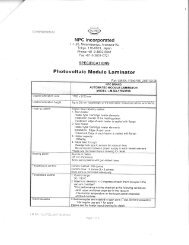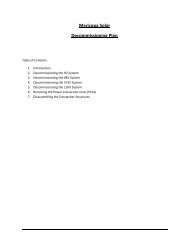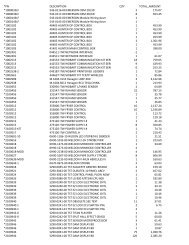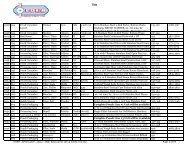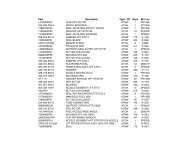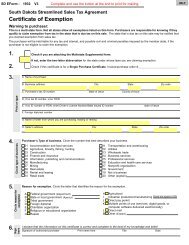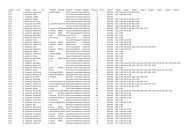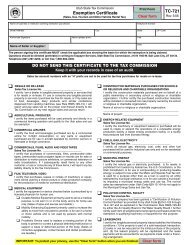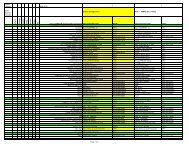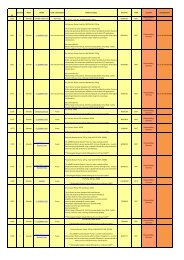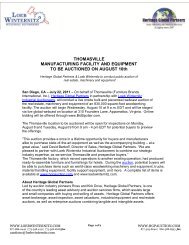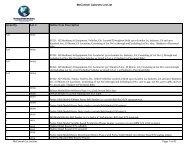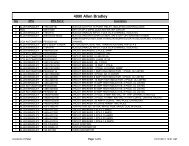Form ST-120: June 1999, Resale Certificate, ST120 - NetSuite
Form ST-120: June 1999, Resale Certificate, ST120 - NetSuite
Form ST-120: June 1999, Resale Certificate, ST120 - NetSuite
Create successful ePaper yourself
Turn your PDF publications into a flip-book with our unique Google optimized e-Paper software.
<strong>ST</strong>-<strong>120</strong> (6/99) (back)<br />
Instructions For Use of <strong>Resale</strong> <strong>Certificate</strong>s<br />
<strong>Form</strong> <strong>ST</strong>-<strong>120</strong>, <strong>Resale</strong> <strong>Certificate</strong>, is a sales tax exemption<br />
certificate. This certificate is only for use by a purchaser who:<br />
A - is registered as a New York State sales tax vendor and has a<br />
valid <strong>Certificate</strong> of Authority issued by the Tax Department<br />
and is making purchases of tangible personal property (other<br />
than motor fuel or diesel motor fuel) or services that will be<br />
resold or transferred to the purchaser’s customers, or<br />
B - is not required to be registered with the New York State Tax<br />
Department;<br />
- is registered with another state, the District of Columbia, a<br />
province of Canada, or other country, or is located in a state,<br />
province, or country which does not require sellers to register<br />
for sales tax or VAT purposes; and<br />
- is purchasing items for resale that will be either:<br />
1) delivered by the seller to the purchaser’s customer or to<br />
an unaffiliated fulfillment service provider located in New<br />
York State, or<br />
2) delivered to the purchaser in New York State, but resold<br />
from a business located outside the state.<br />
Note: For purposes of 1) above, delivery by the seller<br />
includes delivery in the seller’s own vehicle or by common<br />
carrier, regardless of who arranges for the transportation.<br />
If, among other things, a purchaser has any place of business<br />
or salespeople in New York State, or owns or leases tangible<br />
personal property in the State, the purchaser is required to be<br />
registered in New York State. If you need help determining if<br />
you are required to register because you engage in some other<br />
activity in the State, contact the Department (see the Need<br />
Help section). However, a purchaser who is not otherwise<br />
required to be registered in New York may purchase fulfillment<br />
services from an unaffiliated New York fulfillment service<br />
provider and have its tangible personal property located on the<br />
premises of the provider without being required to be registered<br />
in New York State.<br />
If you meet the registration requirements and engage in business<br />
activities in New York State without possessing a valid <strong>Certificate</strong><br />
of Authority, you will be subject to penalty of up to $500 for the<br />
first day on which you make a sale or purchase, and up to $200<br />
for each additional day, up to a maximum of $10,000.<br />
Limitations on use<br />
Contractors cannot use this certificate. They must either:<br />
● issue <strong>Form</strong> <strong>ST</strong>-<strong>120</strong>.1, Contractors Exempt Purchase <strong>Certificate</strong>,<br />
if the tangible personal property being purchased qualifies for<br />
exemption as specified by the certificate, or<br />
● issue <strong>Form</strong> AU-297, Direct Payment Permit, or<br />
● pay sales tax at the time of purchase.<br />
Contractors are entitled to a refund or credit of sales tax paid on<br />
materials used in repairing, servicing or maintaining real property,<br />
if the materials are transferred to the purchaser of the taxable<br />
service in conjunction with the performance of the service. For<br />
additional information, see Publication 862, Sales and Use Tax<br />
Classifications of Capital Improvements and Repairs to Real<br />
Property.<br />
To the Purchaser<br />
Enter all the information requested on the front of this form.<br />
You may check the Blanket certificate box to cover all purchases<br />
of the same general type of property or service purchased for<br />
resale. If you do not check the Blanket certificate box, the<br />
certificate will be deemed a Single-use certificate. Temporary<br />
vendors may not issue a blanket certificate. A temporary vendor is<br />
a vendor (other than a show or entertainment vendor), who, in no<br />
more than two consecutive quarters in any 12-month period,<br />
makes sales of tangible personal property or services that are<br />
subject to tax.<br />
This certificate does not exempt prepaid sales tax on cigarettes.<br />
This certificate may not be used to purchase motor fuel or diesel<br />
motor fuel.<br />
If you intentionally issue a fraudulent exemption certificate, you will<br />
become liable for penalties and interest, in addition to the sales<br />
tax initially due. Some penalties that may apply:<br />
● 100% of the tax due<br />
● $50 for each fraudulent exemption certificate issued<br />
● a misdemeanor penalty consisting of fines not to exceed<br />
$10,000 for an individual or $20,000 for a corporation<br />
● loss of your <strong>Certificate</strong> of Authority<br />
To the Seller<br />
If you are a New York State registered vendor and accept an<br />
exemption document, you will be protected from liability for the<br />
tax, if the certificate is valid.<br />
The certificate will be considered valid if it was:<br />
● accepted in good faith,<br />
● in the vendor’s possession within 90 days of the transaction, and<br />
● properly completed (all required entries were made).<br />
A certificate is accepted in good faith when a seller has no<br />
knowledge that the exemption certificate is false or is fraudulently<br />
given, and reasonable ordinary due care is exercised in the<br />
acceptance of the certificate.<br />
You must get a properly completed exemption certificate from your<br />
customer no later than 90 days after the delivery of the property<br />
or the performance of the service. When you receive a certificate<br />
after the 90 days, both you and the purchaser are subject to the<br />
burden of proving that the sale was exempt, and additional<br />
documentation may be required. An exemption certificate received<br />
on time that is not properly completed will be considered<br />
satisfactory if the deficiency is corrected within a reasonable<br />
period. You must also maintain a method of associating an invoice<br />
(or other source document) for an exempt sale made to a<br />
customer with the exemption certificate you have on file from that<br />
customer.<br />
Invalid exemption certificates - Sales transactions which are not<br />
supported by valid exemption certificates are deemed to be<br />
taxable retail sales. The burden of proof that the tax was not<br />
required to be collected is upon the seller.<br />
Retention of exemption certificates - You must keep this<br />
certificate for at least three years after the due date of the<br />
return to which it relates, or the date the return was filed, if later.<br />
Need Help?<br />
Tax information: 1 800 972-1233<br />
<strong>Form</strong>s and publications: 1 800 462-8100<br />
From outside the U.S. and outside Canada: (518) 485-6800<br />
Fax-on-demand forms: 1 800 748-3676<br />
Internet access: http://www.tax.state.ny.us<br />
Hearing and speech impaired: 1 800 634-2110


